Williamson County is Tennessee’s wealthiest community and has the best schools in the state, some of the biggest churches, a host of Christian nonprofits and a whole bunch of country music stars who call it home.
It’s not the place you expect to find neo-Nazis and white supremacists.
Yet there they were last month, showing up at a forum to back then-mayoral candidate Gabrielle Hanson, a local Realtor and alderman in Franklin, Tennessee, a bucolic suburb 20 miles south of Nashville best known for its Civil War-era mansions, historical downtown and annual Pumpkinfest and “Dickens of a Christmas” festivals.
Weeks ago, on October 24, a local election day, posters from the Patriot Front — which claims real Americans are only those “born to this nation of our European race” — appeared in downtown Franklin while the Williamson Herald, a local newspaper, reported its building had been vandalized and its reporters threatened by neo-Nazis.
While Hanson — whom some supporters, including a self-described prophet, described as God’s anointed candidate — denied supporting racism of any kind, she also refused to denounce the white supremacists who showed up to back her.
Your tax-deductible gift helps our journalists report the truth and hold Christian leaders and organizations accountable. Give a gift of $30 or more to The Roys Report this month, and you will receive a copy of “Baptistland: A Memoir of Abuse, Betrayal, and Transformation” by Christa Brown. To donate, click here.
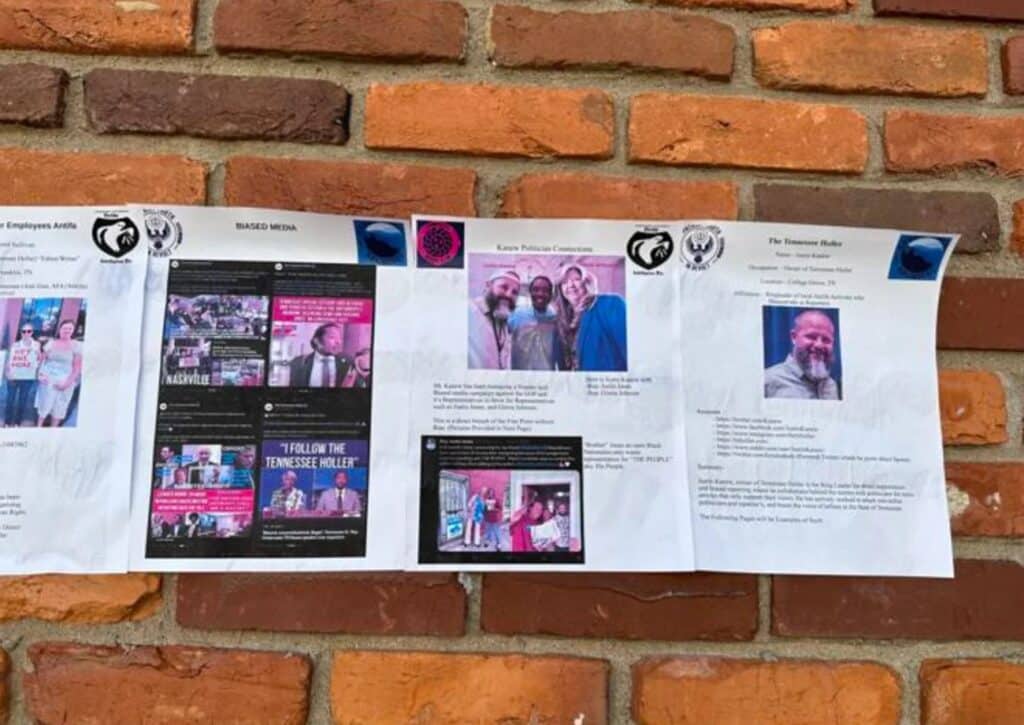
Hanson, who opposed the city’s Pride Fest and has warned that Franklin has become “woke,” told critics that any division due to her campaign was the fault of city leaders.
“This is the old adage of you reap what you sow,” she said.
Hanson lost her mayoral election to incumbent Ken Moore by a margin of 12,822 to 3,322, according to The Tennessean newspaper, due in large part to a huge jump in voter turnout.
Despite her loss, the presence of white supremacists in Franklin has shaken longtime residents like writer Holly McCall, editor-in-chief of the Tennessee Lookout and a former chair of the Williamson County Democratic Party.
“I feel like I need to put a tinfoil hat on because when I start talking to people who aren’t from here,” said McCall, “it sounds absolutely crazy.”
McCall is concerned about the rise of Christian nationalism in Williamson County and worries that Hanson’s run for mayor, even though it failed, will provide a road map for Christian nationalist candidates — especially in well-off communities like Franklin.
“We are the tip of the spear because we look like Pleasantville,” she said.
The kind of Christian nationalism found in these affluent Nashville suburbs is driven not by the so-called deplorables — white, disenfranchised, working-class Americans who are often seen as the core of the “Make America Great Again,” or MAGA, base but by the kind of well-to-do suburban Christians found in Williamson County who have money and influence and something to lose in a changing America.

“This is not the downtrodden,” said author and attorney David French, who lives in Franklin. “This is not like the voice of the forgotten coal miner in West Virginia. This is some of the most privileged people in the whole United States of America, acting like they’re on the brink of unimaginable persecution.”
Hanson — whose campaign website describes her as an American, a patriot, a follower of Christ and a mom — is the latest of a series of Christian leaders warning that Williamson County’s way of life is under threat.
The suburban Nashville county was a hotbed of the Tea Party movement, which was followed by the anti-Shariah movement, support for Donald Trump’s MAGA campaign, and fights over Common Core and critical race theory in local schools. During the COVID-19 pandemic, anti-vaccine and anti-shutdown protesters threatened doctors and other health professionals during a school board meeting, with some shouting, “We know where you live.”
Leaders of those movements were once seen as fringe, said French, who described the old guard as more of the Chamber of Commerce variety of Republicans.
French, a former lawyer with the American Center for Law and Justice and Alliance Defending Freedom, a pair of Christian legal powerhouses, said now those once at the edge of the room are running the place.
French has a hard time understanding the fear that drives people to feel their way of life in Williamson County is in danger. The county — and the broader Nashville region — is filled with what he called “prosperous, professional Christians” who work with publishing houses, Christian music labels and a host of ministries.
It’s hard to go anywhere without meeting someone in the God business.
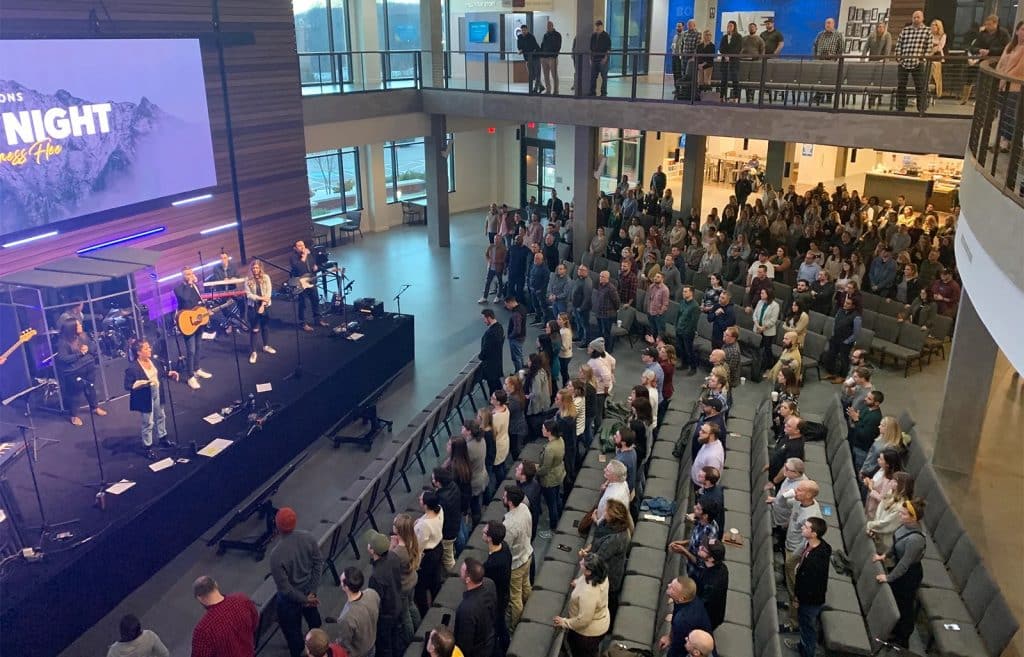
Nashville and its surrounding suburbs, also referred to as Middle Tennessee, is headquarters to Thomas Nelson and Lifeway, two of the nation’s largest Christian publishers. The Educational Media Foundation, the nonprofit that runs K-LOVE Christian radio stations, moved to Franklin in 2021. Ramsey Solutions, the company owned by Christian finance guru Dave Ramsey, is one of Williamson County’s largest employers. Capitol Christian Music is based in suburban Brentwood, as is the Tennessee Baptist Mission Board. A number of United Methodist national agencies are based in Nashville, along with the Executive Committee of the Southern Baptist Convention.
Williamson County has some of the state’s largest and most influential churches, including the Church of the City; Brentwood Baptist; Grace Chapel, whose members include Gov. Bill Lee; and Christ Presbyterian Church, where U.S. Sen. Marsha Blackburn is a member.
About two-thirds of the county’s residents identify as white Christians — including a third who are evangelicals, according to data from the Public Religion Research Institute. By contrast, fewer than half of Americans (41%) identify as white Christians.
Williamson is also home to influential Christian activists such as attorney and radio host Jay Sekulow, founder of the ACLJ, who may be best known in recent years for defending Donald Trump during his 2020 impeachment. Long known for defending religious liberty, the ACLJ has turned more partisan in recent years, especially in its fundraising, warning Christians that their way of life is under attack.
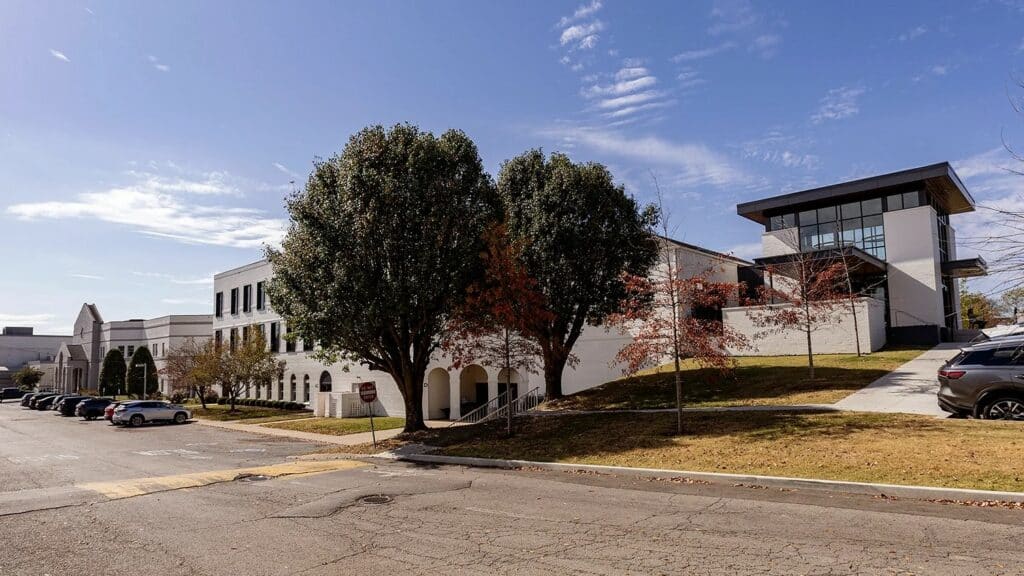
“There’s a massive storm brewing, and our deadline is looming,” read a recent fundraising appeal signed by Sekulow. “I’m gravely concerned that Christians aren’t ready. President Biden is emboldening anti-Christian forces to strip away your religious liberty.”
Proclaiming Justice to the Nations, a pro-Israel evangelical group, is also based in Williamson County. Along with promoting ties to Israel, the group’s founder, Laurie Cardoza Moore, was a vocal opponent of a mosque in nearby Murfreesboro — about 30 miles to the west of Franklin — and a critic of what she saw as “anti-Semitic, anti-American, anti-Judeo-Christian” books in public schools. Her activism led to Moore being appointed to a statewide textbook review board.
There’s so much overlap between God, big business, entertainment and politics that the area’s culture has earned a few nicknames. David Dark, an author and professor at Belmont University, one of the area’s three major Christian colleges, called that nexus the “Prayer Trade.”
Phil Vischer, the co-creator of “VeggieTales” and a co-host of the popular “Holy Post” podcast, calls it “Christian Nashville-ism” — a Southern and distinctly evangelical version of Christian nationalism.
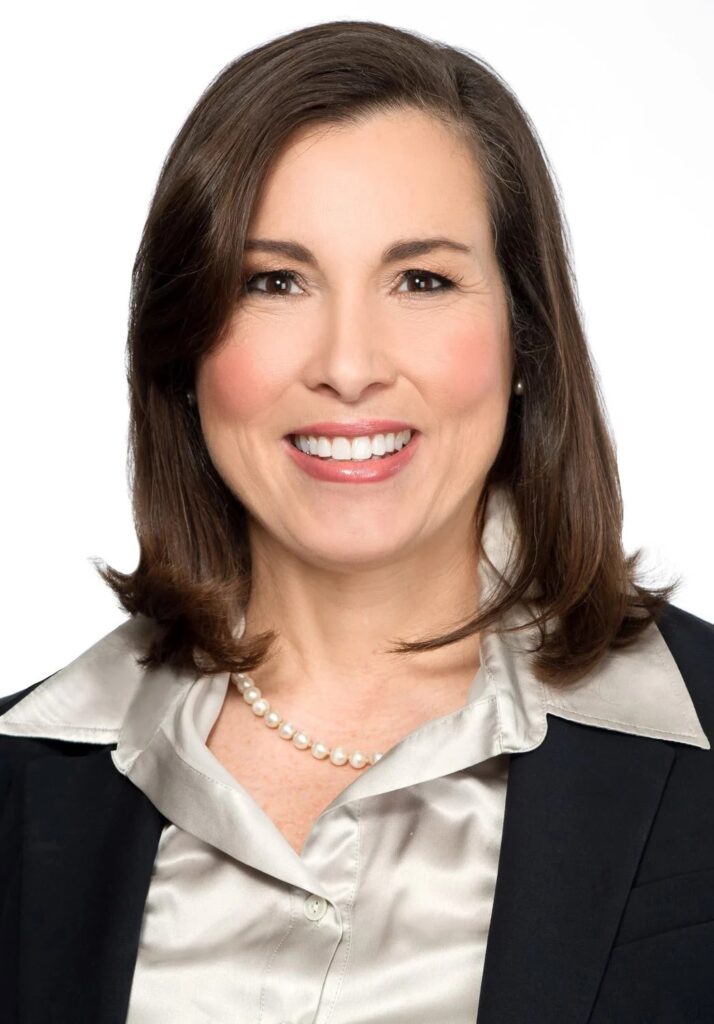
McCall, a lifelong Tennessean, said Williamson County has always been conservative — and religion has always played an outsized role — but it’s more intense now. She pointed to the COVID-19 pandemic and the rise of Trump — as well as an influx of evangelical Christian groups and conservative influencers such as Ben Shapiro and the Daily Wire to Nashville.
These newcomers, including Hanson, left other states seeking refuge in Tennessee and claiming Nashville and its suburbs belong to “white Christian patriots” like them, said McCall.
And, while much of their God and country rhetoric sounds like what is sometimes called “Cracker Barrel Christianity,” what sets Christian nationalism apart from more aspirational forms of religious patriotism is its focus on outside enemies.
Those who are not Christian or not sufficiently Christian are accused of undermining the true nature of America. Such thinking also promotes what scholars call “participatory anti-democracy” — mobilizing people to make sure their views win no matter what. This paints fellow citizens who disagree with them as the enemy.
“I don’t think people who follow politics at the national level appreciate sufficiently how pervasive the bullying and name-calling is at the local level,” French said.
A similar movement of outsiders helped turn Colorado Springs into a stronghold of the religious right in the heyday of groups like Focus on the Family, said Will Schultz, a religious historian at the University of Chicago Divinity School.
In the 1980s and 1990s, Focus and other evangelical nonprofits moved to Colorado Springs, creating a “Mecca for Evangelical Christians,” as NPR put it, and turning Colorado into a battleground over gay rights and other social issues. Those newcomers, often from more liberal places such as California or the East Coast, teamed up with conservative activists already in the region to oppose LGBT rights.
“All of a sudden, in their backyard, they see the very forces they’d come to Colorado trying to escape,” said Schultz.
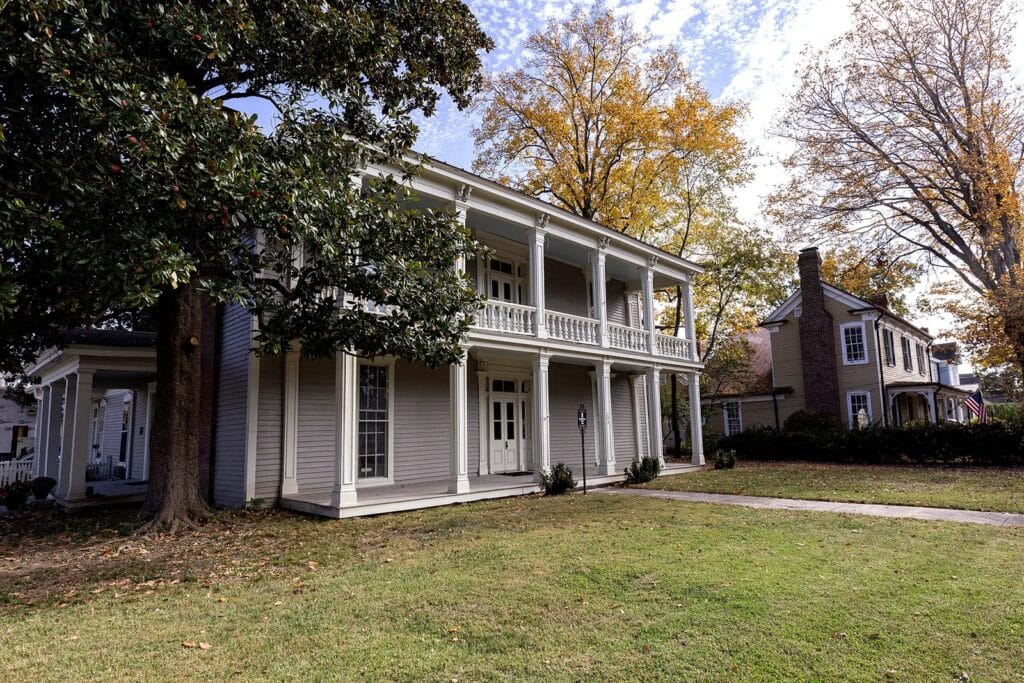
Darren Dochuk, a historian at Notre Dame and author of “From Bible Belt to Sunbelt: Plain-Folk Religion, Grassroots Politics, and the Rise of Evangelical Conservatism,” said suburban communities often have the feel of a small town, including a sense of autonomy that is protective of conservative social values and suspicious of the federal government.
That kind of conservatism, he said, is often fueled by fear-driven political rhetoric that motivates people to put their money and connections to work to protect what they see as theirs.
“They are fiercely driven and outspoken and they have institutions including churches around which they can rally and coordinate,” Dochuk said. Add in assets like social media, and it becomes easier for well-off suburban Christians to turn their anxiety into populist action.
He said the influence of the Tea Party — which launched a series of anti-government protests during Barack Obama’s presidency, often in well-off communities like Franklin — has been overlooked in the Trump era. Dochuk said scholars and journalists often overlooked the role that religion played in the Tea Party.
“What we see today in Trump America can be explained in no small part through the success of that movement,” he said. “And that movement was again driven not by the deplorables, but by those with something to lose.”
Calvin University history professor Kristin Kobes Du Mez, who studies conservative evangelicals, said the power of the moms in places like Williamson County should not be underestimated. These affluent suburbs are filled with talented and well-connected conservative women who see political activity — especially when it comes to issues that affect their children — as an outgrowth of their faith.

“Conservative Christian women have long mobilized to protect their children and to protect their families,” she said. “This goes back generations.”
They are also often heavy consumers of Christian radio and publishing — which have become more political. When the same trusted sources that provide the Christian music they love and the Bible studies they read also tell evangelical women their families and their faith are under attack, they will take action, said Du Mez.
Du Mez also said being in a wealthy, insulated community filled with like-minded neighbors means these Christian women are less likely to run into people who challenge those messages. Instead, their circles include those who share their fears and reinforce them.
“This is not primarily economic anxiety,” she said. “This is status anxiety.”
Melissa Deckman, CEO of PRRI, said concern about cultural issues has driven support for MAGA-style politicians, rather than economic concerns.
She pointed to data from PRRI’s latest Americans Values Survey, which found that white evangelicals (59%), white mainline Protestants (53%) and white Catholics (53%) — as well as Black Protestants (52%) — all preferred a presidential candidate who could “protect and preserve American culture and the American way of life” over one who could manage the economy. Republicans (58%) also preferred a president who could preserve American culture.
“The economy truly takes a back seat for MAGA Republicans in most cases because they believe the threats they perceive in the country — growing secularization, changing demographics, more identification as LGBTQ among younger Americans — are far more disturbing to their worldview and to their own base of power,” said Deckman.
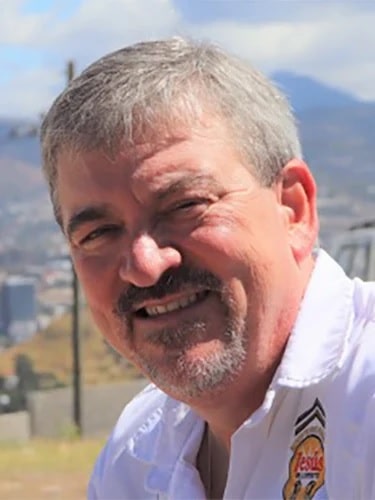
Kevin Riggs, a Freewill Baptist pastor and longtime community activist in Franklin, said he began speaking out about Christian nationalism around the time Trump announced his run for the White House because Riggs worried some of his fellow pastors had embraced the idea that America belongs only to Christians.
That’s a claim, he said, that is dangerous for the nation and for the church. Riggs, who said he holds evangelical theology and more progressive social views, said criticizing Christian nationalism cost him a lot of friends.
“And things have only gotten worse since then,” he said.
Despite Hanson’s loss, Riggs worried her run for mayor — and her term as an alderman — could provide a road map for Christian nationalists in other parts of the country. And he worries the beliefs that fueled her run for mayor will spread as well.
“We as a county are the unofficial headquarters of Christian nationalism in the United States,” he said. “Mainly because of the power and money and the influence that comes out of here. Everything in the evangelical Christian world at some point comes through Williamson County.”
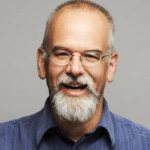 Bob Smietana is a national reporter for Religion News Service.
Bob Smietana is a national reporter for Religion News Service.




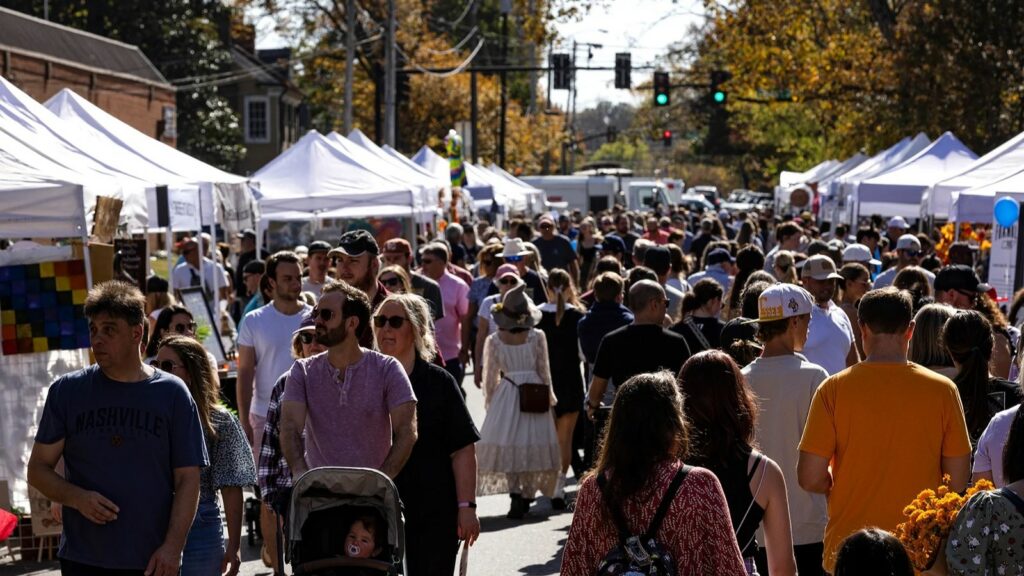
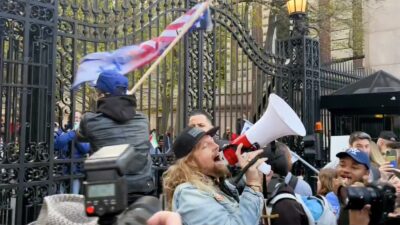


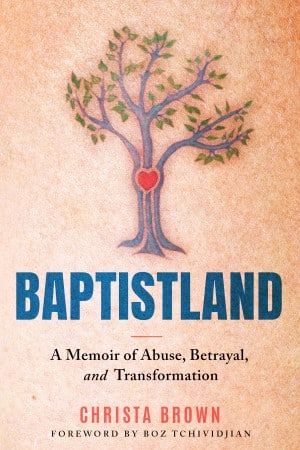
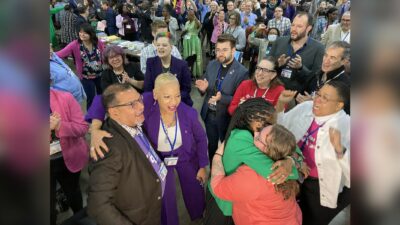
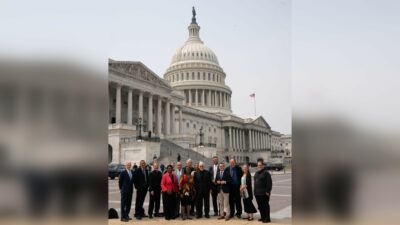

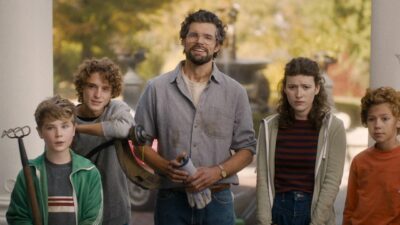







11 Responses
There are European historical parallels with what the article above speaks to. As the twentieth century unfolded, European Imperialism and Colonialism came under pressure for change. Pressure for change abroad and in the respective home societies, intersecting. Privileged constituencies within those home societies, then engaging in (often exotically mindboggling) reactive processes intent on countering incipient change.
While these European parallels tend to be viewed with the benefit of hindsight (knowing that these reactions largely failed in their intent), what the article speaks to retains the understanding that such failure is not a given, retains focus on the very complex human dynamics engendering the intent . Even where such reactionary intent does fail, European twentieth century history illustrates what can destructively take place before such intent weakens to a degree of organic insignificance.
Remind me to never move to Williamson County. Scary
On the one hand, this does seem like it might be much ado about nothing since Hanson lost by a ratio of 4 to one, but in as much as it is a trend that should be noted, I think Ms. DuMez has the most astute observation regarding polarization exacerbated by isolation:
“…being in a wealthy, insulated community filled with like-minded neighbors means these Christian women are less likely to run into people who challenge those messages. Instead, their circles include those who share their fears and reinforce them…”
It’s alot easier for someone in an affluent “christian” bubble to feed their fear when their friends and media reinforce the fear and you have little or no daily contact with the Democratic, LGBT, Minority, immigrant, non-christian, etc, etc people you are being taught to fear. In general it’s much harder to fear people you have everyday contact with even when they may look/act/talk/believe/earn differently than you.
I truly am interested in what these communities fear. What has REALLY changed in their bubble over the last decade to have them so afraid of “losing something”?
I truly believe proximity is the key to healing, confronting, and conquering this sort of ignorance, fear and bias. When you are able to develop deep relationships with those who are not like you, you’ll be surprised at how most want the same things as you (safe neighborhoods, good schools, job security, etc) and are too focused on making that happen for their own families to be concerned with “taking” anything from you.
Makes me think of times that I’ve developed deep relationships with people of other races who were surprised to hear my friends and I are too focused on our own families, faith and careers to be having “we hate white people” conversations all day. It’s so easy to build up false, inflated images of others we don’t know.
Where there’s fear there has to be those who spread the fear. I’m sure part of that starts on the Christian radio stations that these people have their ears glued to and their political leaders. Many of their listeners and devotees listen to them unconditionally and assume what they have to say is true without question.
I agree but kind of also disagree slightly with Mr Riggs… with this viewpoint…, “and he worries the beliefs that fueled her run for mayor will spread as well.”
I would say those beliefs have already spread far and wide – they are endemic in most white evangelical churches, if not all of them. I would say we are beyond the stage of “spreading” but more in the entrenching stage… All my conservative/GOP leaning family, friends, fellow parishioners ALL believe, talk about, or allude to, or proclaim, various if not all the talking points of the most politically active/running for office christian nationalists (especially the ‘be Very Afraid talking points…) And they are all well off, privileged, rural to suburban, mostly living in the quietest/safest towns/neighborhoods in America – yet they are afraid of terrible things just around the corner that will befall them… It doesn’t take much for a candidate like Hanson to win them… they are all primed to the hilt with big overblown fears and angst. It has been spreading already. A greater worry is; how far will they let the radicalization take them?
A number of my retired former LEO co-workers have moved to TN and are constantly banging the drum about how much they like it. I suspect white Christian nationalism is the draw along with no income tax and low property tax. Along with those low taxes comes the dismal spending on public education.
We welcome enlightened people who love the Lord and who pay outrageous sums of money on houses who want their kids in good public schools! I can’t imagine paying what the un-enlightened parents pay to put their kids in private schools! Wilco rocks! Oh and by the way…we have a multicultural neighborhood who seems to not to care about your background or your skin color! Stay away you ignorant fools!
“Stay away you ignorant fools!”
Always nice to encounter a loving, non- judgemental Christian. Trust me, I’ll stay off of your lawn!
Unintentional humor lives! We’re told that dark right-wing forces are threat entering to “take over”. How? By threatening a ” take over” by dark left-wing forces! “Scholars” (which ones?) say so! Its “Cracker Barrel Christianity”-a term I’ve never heard of in 48 years as a Christian. The passive voice always weakens an argument., BTW.
This article does not come up to Julie Roys standards. Or even Wikipedia standards. Nothing against the author, but this is the religious/political equivalent of a jump scare in a bad horror movie. He makes some good points; a thoughtful, thorough rewrite would help.
This entire article is “fueled by fear-driven political rhetoric.” 🙄